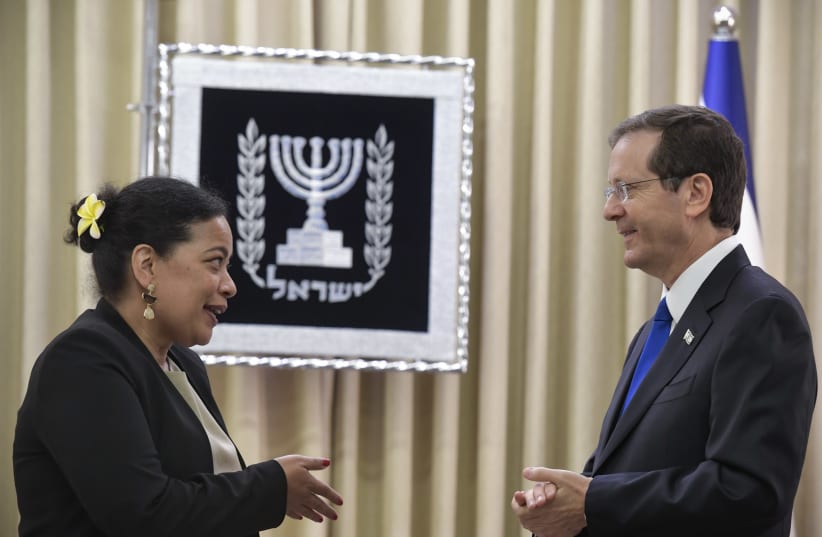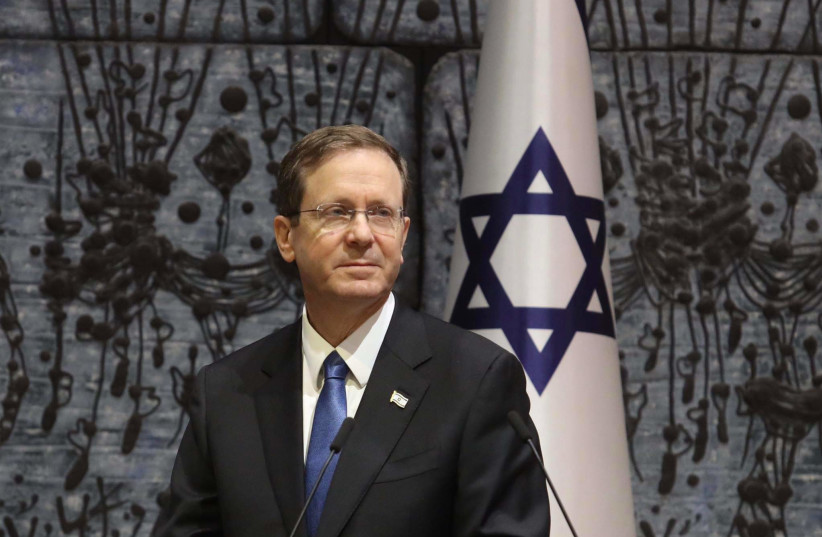The mythical glass ceiling has been broken in many places. Professions once dominated by men with a token woman in a sham display of gender equality are now in many cases dominated by women. In fact, there are few professions – if any – that are now closed to women.
One previously male-dominated profession in which women have increasingly proved their capabilities is diplomacy. There was not a single man among five new ambassadors, including one non-resident who on Thursday presented their credentials to President Isaac Herzog.
The five women came not only from different countries but different continents – an indication that the gender revolution has taken hold almost everywhere.
Susana Gun de Hasenson of El Salvador and Cecilia Attard Pirotta of Malta have previously served as the ambassadors of their countries to Israel. Rita Maria Hernandez Bolanos of Costa Rica, an international lawyer by training, and Helen Sophie Deller Klein of Ecuador, who was previously a businesswoman, are serving in Israel for the first time, while Margo Deiye of Nauru is a nonresident ambassador whose permanent location is in New York. Two of the five ambassadors are Jewish.
Under previous regimes, Costa Rica and El Salvador were the last countries to leave Jerusalem, long after the embassies of other countries had moved to Tel Aviv. Both embassies remained in Jerusalem till 2006. El Salvador was the last to go, but the El Salvador residence remained in Jerusalem.
Former El Salvador president Jimmy Morales had intended to move the embassy back to Jerusalem, but under the present El Salvador administration, that decision was a non-starter. When De Hasenson was a little girl, her mother was president of WIZO in El Salvador. Golda Meir, who was then foreign minister, came on a visit to El Salvador and was so inspiring that the young Susana immediately decided she wanted to be a diplomat and wanted to live in Israel.
Her sister actually got to Israel before her, coming on her own at age 17 and enrolling in a course in medicine at the Hebrew University of Jerusalem. For many years now, she has been a medical researcher and is currently working on a preventive medicine that will put a clamp on Alzheimer’s. “You have to start drinking it every day once you turn 60,” she told Herzog. The president, who turned 61 in September, asked if it would still work on people of 61.
When Gun de Hasenson came to Israel, she too enrolled at the Hebrew University, and it was there that she met her husband, Dave, who was born in Finland and is a qualified tour guide. Although Gun de Hasenson has spent a major part of her life in Jerusalem, it was during her previous term as ambassador that the El Salvador Embassy relocated to Tel Aviv.
When Herzog commented on this, she acknowledged the fact saying, “Yes, we were the last to leave,” but offered no explanation. What caught the president’s interest most during their conversation was the fact that El Salvador, which is such a small country, has such a successful economy and at the instigation of President Nayib Bukele, is the first and so far the only country to adopt bitcoin as official currency.
“Bitcoin is fascinating the economic press. It’s part of the development of the way that people will do business in the future,” Herzog enthused. He was surprised by Attard Pirotta’s return to Israel so soon after completing her previous term of service in the country.
“It was unplanned,” she conceded, but her immediate predecessor, who had actually succeeded her, left unexpectedly, and she was offered the opportunity to return and was happy to come back.
For all that, relations between Israel and Malta are not exactly rosy. Herzog said frankly that some of the criticism that has come from Malta has been unfair, and that Israel is eager to improve relations. The ambassador said this was possible on a cultural level. She hinted that it would be a little more difficult on a political level, but agreed with Herzog that once the pandemic scare becomes history, tourism between the two countries should be resumed and encouraged.
Malta’s Jewish community is small, ranging somewhere around 200, but they live well and most are religiously observant. There’s a synagogue with an Orthodox rabbi. Chabad is also active in Malta.
An immediate common link between Herzog and Costa Rica’s Rita Maria Hernandez Bolanos was the fact that both are lawyers. Bolanos is an international lawyer, which provided them with yet another link. Herzog told her that one of his mother’s cousins, Sir Elihu Lauterpacht, had been one of the founders of the International Court of Justice in the Hague.
Aside from that Herzog told her that her country is regarded with affection in Israel because of the close friendship between their countries from the very beginning. There was also the fact that there is virtually no antisemitism in Costa Rica, but the country has yet to adopt the IHRA (International Holocaust Remembrance Alliance) agreement as part of a global campaign to preserve the memory of the Holocaust and to fight antisemitism.
Almost casually Herzog said, “We remember that Costa Rica had an embassy in Jerusalem and we would be happy to see it return.” The ambassador replied that she would convey the message to the relevant authorities in her country.
What particularly stirred Herzog’s curiosity was the fact that Costa Rica has no army. “How can you run a state without an army?” he asked in amazement. “Our country is based on international law,” the ambassador replied.
Ecuador’s Helen Sophie Deller Klein, was the only ambassador out of the five for whom this was a first appointment. Moreover, she is Ecuador’s first political appointee to be sent to Israel and the first Jewish appointee. The product of a Jewish day school and active in Ecuador’s Jewish community, Klein is a second-generation Holocaust survivor.
On her father’s side, her family comes from Bavaria, where her grandfather was head of the local Jewish community. After the rise of Nazism, he suffered much humiliation before applying to leave the country with his family. They got out just in time in 1938.
Her mother’s family, from Krakow in Poland, was saved by a Christian family, but she was never able to get the full story. Her mother’s family arrived in Costa Rica in 1948. Herzog told her that Yad Vashem executive chairman Dani Dayan, a former diplomat who is himself from South America, would help her if she asked. The ambassador was very grateful for the information.
As far as Ecuador’s relations with Israel are concerned, she said that President Guillermo Lasso, who is due to visit Israel early next year, “has identified Israel as one of the key countries in the world.” She added that he is very eager to come. He has previously been to Israel on a private visit.
In his conversation with Nauru’s Margo Deiye, who also serves as Nauru’s permanent representative to the United Nations, Herzog wondered how such a tiny small republic with so many challenges could continue to hold. The ambassador laughed and said, “We’re a bit like you.” In all five conversations, Herzog asked about COVID in each country, and was happy to learn that in all cases, the countries were almost COVID-free.

